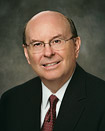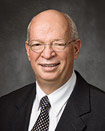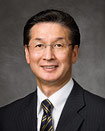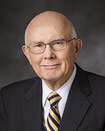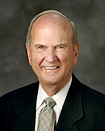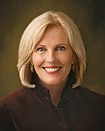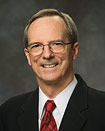This entry is part of my general conference application series.The Importance of a Name, by M. Russell Ballard
Of the Quorum of the Twelve Apostles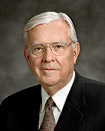
My three-yr-old son loves his name. At the store, someone may say, "You sure are cute," but his reply is, "No, I'm Benjamin!"
Around the house I'll ask him if he's being a big helper, and he reminds me, "No, I'm Benjamin!"

I've even heard him correct someone who called him Benjamin, replying with his full name: first, middle, and last.
He likes his name.
As we've welcomed each child into our family, my wife and I have given careful consideration to their names. Each of our children have names with specific purpose—family history, in the case of our family. They have their own names, but their names can remind them of ancestors who came before.
Elder Ballard said something similar:
Each child is a welcome addition to our family. Each has received a special name chosen by his or her parents, a name to be known by throughout his or her lifetime, distinguishing him or her from anyone else.
While each member of my family has his/her own name, we share two names: our last name, and that we take upon us the name of Christ through sacred covenants. Elder Ballard spoke about this, and it reminded me of a previous talk by President Packer (
link, which Elder Ballard referred to as well). He also spoke of the length of the name of the Church:
I have thought a lot about why the Savior gave the nine-word name to His restored Church. It may seem long, but if we think of it as a descriptive overview of what the Church is, it suddenly becomes wonderfully brief, candid, and straightforward. How could any description be more direct and clear and yet expressed in such few words?
This discussion reminded me of my response to talk by Elder De Hoyos (
link, I must not have any original thoughts today!) where I discussed the Book of Mormon musical's playful poke at the name of the Church. It may sound funny to some, but it's packed with meaning!
Sort of like the names we chose for our children.
I enjoyed Elder Ballard's instruction on the differences between using the terms Mormon and the Church of Jesus Christ of Latter-day Saints.
So while it's true that I'm a Mormon (I even have a profile on
Mormon.org), I'm not a member of the Mormon Church, but of the Church of Jesus Christ of Latter-day Saints.

And if you tell my three-yr-old son that he's an adorable Mormon, he'll likely tell you that he's just "Benjamin!"
We're helping him learn the looong name of the Church; we're also preparing him to take upon himself the name of Christ. But until then, he may insist, "No, I'm Benjamin!"


